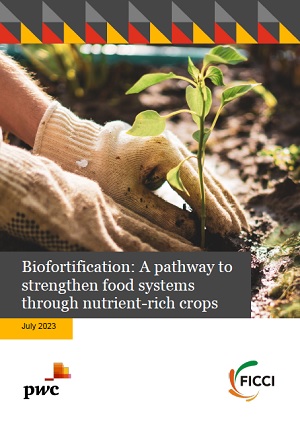Biofortification: A pathway to strengthen food systems through nutrient-rich crops
July 2023 | Agriculture
Over the last few decades, the burden of malnutrition has drawn significant attention in India at the national and state levels, leading to a shift in focus from ensuring food security to nutrition security. In order to fulfill the nutritional requirements of the population, the agriculture sector is gradually shifting from being production[1]centric to ensuring that the production of nutrient-enriched food crops is in sufficient amounts. The central and state government is implementing multiple programs contributing to improved nutrition outcomes. Substantial progress has been achieved on production enhancement and diversification, and steps are being taken to promote nutri-cereals.
Among the various strategies which have been adopted to address malnutrition, biofortification has emerged as an effective strategy to improve the nutritional status of human beings without changing existing dietary patterns. Biofortification tends to approach the issue of micronutrient malnutrition by enhancing the micronutrient content in food crops that form the most acceptable diet of the vulnerable population and varieties that are high-yielding or profitable for the farmers.
The market trend for biofortification is increasing owing to the rising demand for nutrient-enriched food. Globally, the market size for biofortification is valued at USD 100.84 million in 2022, which is projected to grow at a CAGR of 8.9% from 2023 to 2030 reaching a value of USD 217.21 million by 2030.7 The rising biofortification market is expected to be fuelled by increasing consciousness of consumers towards health and growing investments in agricultural technology.
The Government of India has identified and advocated nutrient-enriched crops as one of the effective pathways for tackling micronutrient malnutrition and is also implementing multiple programmes to address micronutrient malnutrition such as provision of supplementary food through ICDS, mid-day meal programme, National Nutrition Mission, and prophylactic supplementation of iron, vitamin A, and folic acid. Furthermore, with the proofs of concept provided by private players in the field of biofortification, several organisations in India initiated research and development projects in the 2000s towards biofortified cereals funded through national and international agencies.8 The Indian Council of Agricultural Research (ICAR) is playing a critical role in providing necessary impetus in the domain of crop research and development for food grain production in India. ICAR has improved the nutritional quality in high yielding varieties of cereals, pulses, oilseeds, vegetables, and fruits using breeding methods.
The public sector plays a vital role in providing an enabling environment for enhanced uptake of biofortified crops both at supply and demand side of the food system. Further, conducive policy environment is crucial for enhancing the outreach of nutrient-enriched crops so that the benefit of consuming such food gets translated to the vulnerable population.
Biofortification as a strategy for tackling micronutrient malnutrition is not a mutually exclusive approach. In the presence of various other approaches to reduce micronutrient deficiencies in the population, it is pertinent to explore the probabilities of complementing strategies that augments the delivery of necessary micronutrients to the vulnerable population without being resource intensive. In this context, the possibility of combining biofortification with large-scale food fortification (LSFF) may be employed as a strategy for reaching out to a large population with essential micronutrients that are deficient in the diet.
Various strategies have been adopted across the globe for scaling up for biofortified food grain to address prevailing condition of malnutrition in the underdeveloped and developing world. We propose the marketing-supply-policy support-institutional strengthening (MSPI) strategy to achieve the goal of scaling up biofortification.
The adoption of biofortification on a large scale would require robust policies from the Government ensuring market drive for sustainable growth and a continuous and effective supply drive. Convergence of various health and food supply programmes, policy monitoring to review improvements achieved, incentivisation through subsidised seeds, better prices, etc., capacity building and catalysing and enabling partnerships along the staple crop value chains to replace non-biofortified seeds, grains, ingredients, and foods with their biofortified counterparts, are some of the policy dimensions to overcome the bottlenecks.
Market drive for sustainable growth is also critical and can be achieved through direct farm gate purchase, increase consumer awareness, proper labelling and packaging, while the supply drive can be strengthened through improving farmer acceptance and awareness, developing a robust value chain and umbrella branding through an unified logo.
India is going through a major shift in its nutrition status with an increasing population facing micronutrient malnutrition irrespective of geography or socio-economic strata. As discussed in this report, biofortification is an evidence-based, cost-effective, and sustainable strategy for fighting micronutrient malnutrition. However, the existing agricultural policies in their current state are insufficient to address both conditions as policy orientation is still majorly skewed towards maximising macronutrients through production and consumption of staple crops. With adequate reserves of rice and wheat and focus shifting from food security to income security, a designed diversification from crop-centric farming to nutrient-enriched crops is the appropriate way to tackle micronutrient gaps in consumption and to reach the optimum potential of biofortification in tackling micronutrient malnutrition, there is need for collaborative efforts amongst the agri-value chain actors.
Please enter your resgisterd email ID or registration ID
If you are not a FICCI member, continue to register. Non-FICCI members can download only one FICCI Knowledge Paper. Please submit the deatils.
